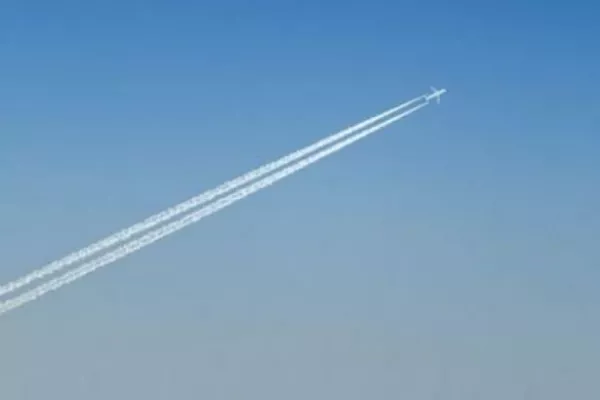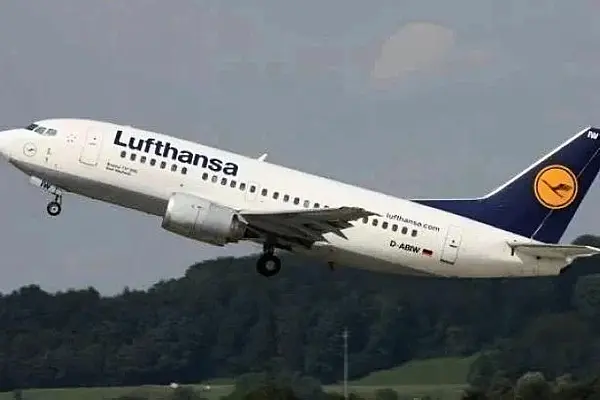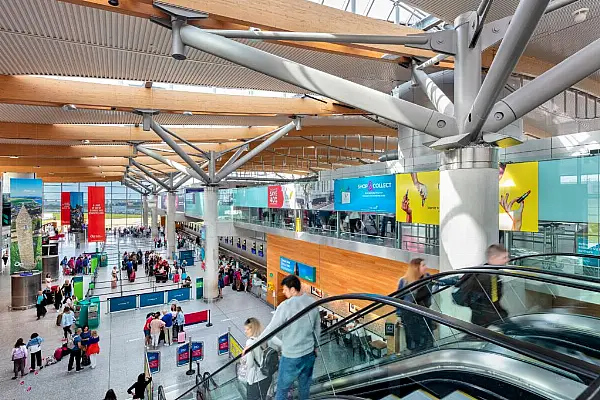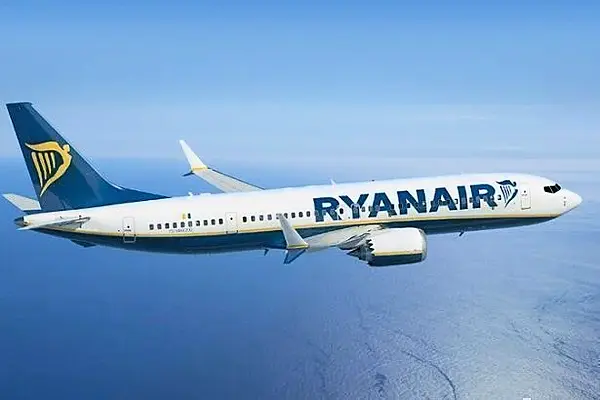Hospitality Ireland presents a round-up of global aviation and airline news.
Britain Should Use COP26 To Push Sustainable Aviation Fuel - Heathrow CEO
Britain should put policies in place to ensure airlines start switching to sustainable aviation fuels, said the boss of the country's busiest airport said on Monday October 11, ahead of the COP26 global climate conference which starts later this month.
Airlines, airports and manufacturers are all pressing for government support to increase production of sustainable aviation fuel (SAF) to help them lower their carbon footprints and enable the industry to hit its climate goals.
The chief executive of London's Heathrow airport said Britain, as COP26 host, should lead the world in helping to scale up SAF production by bringing in rules for its use, a price support mechanism via contracts for difference, and loan guarantees.
"We should aim for 2019 to have been the peak year for fossil fuel use in global aviation," Heathrow boss John Holland-Kaye said in a statement on Monday.
SAF generally produces up to 70% less carbon than fossil fuels but is more costly, particularly as production volumes are currently very low at less than 1% of total jet fuel demand.
The aviation industry has thrown its weight behind SAF as a way to make flying more environmentally friendly before less carbon-intensive hybrid, electric or hydrogen aeroplane options become available from the late 2030s.
Facing mounting pressure from regulators and environmental groups, global airlines earlier in October committed to "net zero" carbon emissions by 2050.
Heathrow earlier on Monday reported that its passenger numbers remained depressed in September, coming in at just under 40% of pre-pandemic levels from 2019.
The airport should see volumes rise in October, however, as British travel rules have recently been relaxed. On Monday, a change came into force meaning just seven countries remained on its COVID-19 high risk 'red list' which requires arrivals to quarantine in a hotel.
Jet Set Scramble As Skyrocketing Demand For Private Planes Drives Delays, Cancellations
Private business jets once provided refuge from airport waiting lines for the few that could afford them, but the fading pandemic has driven demand to such heights that even wealthy travellers now face cancellations and delays.
While a headache for some jet set travellers, the crunch is a boon for makers of corporate planes built to carry 19 or less passengers in luxury, with announcements for new orders expected at the world's largest business jet show that starts Tuesday October 12.
Some fractional ownership and charter plane operators are turning away business, face a further crunch as the holiday season looms - and are buying more planes.
Traffic has surged above 2019 levels in the United States. Combined with staffing shortages, the situation is squeezing industry services from fuelling to catering, while fewer spare planes are available to replace jets that break down, executives said.
To protect service, NetJets Inc recently suspended sales of jet cards, which allow customers to pre-pay for blocks of flight hours.
The world's largest private jet company said it is investing approximately $2.5 billion for 100 new aircraft to be delivered between now and the end of 2022.
"The vast number of flights is taxing the air travel infrastructure in ways we haven’t seen in years," said Ohio-based NetJets.
It saw about 10 times more flights delayed due to air traffic control in June 2021, compared with June 2020 when flights dived during the pandemic.
Flight demand is "currently exceeding all other highs" in its 57 years, with an average of around 500 flights a day compared to under 400 a day in 2019, it said in a statement.
"While most owners have experienced business as usual in their recent travels, a few have felt the challenges that coincide with heightened demand across the industry," it said.
Fly Exclusive, which provides jets to charter operators in a kind of wholesale business, is seeing a significant increase in requests since their clients are increasingly running short of aircraft.
Investors closely watch the dynamic in the private jet market as operators are key customers for corporate planemakers.
The delays are creating complaints among affluent travellers who are already looking for alternatives.
Amanda Applegate, a partner at aviation law firm Aerlex Law Group said she received 10 calls last month alone from clients who were unhappy with their service.
"In good times I don’t get any calls or at most one or two every six months or so," said Applegate, who works on deals to buy and sell planes and is an information hub for her clients.
Applegate said she isn't quite sure what to tell private jet clients who are looking for the best service. "There's just not enough capacity."
Ian Moore, chief commercial officer at private jet company VistaJet, said there is less tolerance in the industry for customers who cancel or put off flights at the last minute without penalty because they get stuck at in a meeting.
Now, the planes don't wait. "There's just not enough supply for that anymore," Moore said.
Lufthansa Repays €1.5bn Of State Aid After Cash Call
Deutsche Lufthansa said on Monday October 11 that it had wrapped up a €2.16 billion capital increase and used the proceeds to repay €1.5 billion in state aid as it banks on a rebound in air travel.
The German airline paid back the first of two tranches of hybrid capital, dubbed silent participation, it received as part of a 2020 bailout, it said.
The company added it also intends to fully repay the second tranche, worth €1 billion, before the end of this year.
"Today, we are keeping our promise and paying back a large part of the stabilization funds earlier than expected. We are increasingly confident about the future," said Chief Executive Carsten Spohr.
He added demand for flights, especially from business travellers, was growing daily, though the market remained challenging.
The airline also aims to terminate an unused portion of the first participation tranche before the end of 2021. A state loan of €1 billion was repaid in February.
Lufthansa said last week its rights issue was 98.36% subscribed by investors, and the remainder was quickly sold in the open market.
The airline last year received a €9 billion government bailout to stay afloat through the COVID-19 pandemic, which resulted in the German state's Economic Stabilisation Fund (ESF) taking 15% of Lufthansa's shares.
That stake was trimmed in the rights issue to 14.09%.
Lufthansa said on Monday October 11 that the ESF had committed not to sell any shares over the next six months, but would divest them completely in the 24 months after the capital increase, provided the airline repays the two participation tranches, among other contractual requirements.
After Mass Cancellations, Southwest Expects Flights To Normalise This Week
Southwest Airlines Co said on Monday October 11 that it expects to resume normal service this week after cancelling more than 2,500 scheduled flights since Saturday October 9, blaming unfavorable weather and air traffic issues in Florida.
The airline had cancelled 1,124 flights, or 30% of its daily operation, on Sunday October 10 and more than 800 trips on Saturday October 9, according to data from flight tracking platform flightaware.com. The website also showed over 588 cancellations on Monday October 11.
Southwest Chief Operating Officer Mike Van de Ven said in a message to employees late on Sunday that the sudden flight cancellations had caused staff shortages and may lead to a reduction in the number of flights the company can operate in November and December.
Southwest, whose shares fell as much as 4.3%, did not give the number of cancellations, but said it was "significant".
"While we work to stabilize our operations, we anticipate to resume normal service this week," the airline said in a reply to a tweet from a flier asking about a cancelled flight.
Meanwhile, its pilots union has denied speculation on social media that the cancellations were due to their action.
The union said in a statement on Saturday October 9 that it was "aware of operational difficulties" but its pilots were "not participating in any official or unofficial job actions."
It had last week said it would file a temporary restraining order to stop Southwest from complying with a COVID-19 vaccine mandate for federal contractors, which included major airlines.
Southwest's executive vice president of daily operations, Alan Kasher, said on Sunday October 10 that due to the staffing shortages caused by the weekend's disruptions, the airline would implement mandatory overtime for employees.
The Federal Aviation Administration said on Sunday October 10 that "no FAA air traffic staffing shortages have been reported since Friday. Flight delays and cancellations occurred for a few hours Friday PM due to widespread severe weather, military training, and limited staffing in one area of the Jacksonville en route centre."
Business Jet Makers Look To Tap Surging Travel Demand At Las Vegas Air Show
Planemakers are unveiling new orders and fresh models at the world's largest business jet show this week as they aim to cash in on a boom in private travel, but executives warn of headwinds due to a capacity crunch.
The National Business Aviation Association (NBAA) show returns to an in-person format starting in Las Vegas on Tuesday, testing the strength of demand for jets following the emergence of COVID-19. The show will also shed light on the resilience of the aerospace supply chain, given strained logistics worldwide.
Brazil's Embraer said on Monday morning it signed a deal to sell 100 Phenom 300E planes for more than $1.2 billion at list prices to NetJets, with deliveries starting in 2023.
U.S. planemaker Textron Aviation announced updates to the models of two of its Cessna Citation jets, the M2 and XLS.
Easing travel restrictions and the lure of private flights have led to an unexpected surge in business aviation, with traffic rising from 2019 levels. That is filling seats for private operators and expanding order backlogs for planemakers, straining the supply of jets, parts and pilots.
Craig Ross, head of California-based Aviation Portfolio, an adviser to business jet clients, said he is seeing cases of flights getting canceled because of a lack of pilots and delays from a shortage of plane parts for maintenance.
That is occurring in an industry that charges top prices for reliability, with some private operators turning down business to protect service.
"Everyone will be talking about the same thing: 'How do we deal with this demand,'" said Ian Moore, chief commercial officer of private jet company VistaJet. "I'm sure that's going to be a topic at every booth and every cocktail party in Vegas this year."
One top supplier, Honeywell International Inc, is predicting a 50% rise in business jet flight hours in 2021 over last year.
General Dynamics Corp's Gulfstream Aerospace, one of the largest business jet makers, is not participating due to COVID-19. The U.S. planemaker recently announced two new jets, with its larger G800 set to clash with Bombardier Inc's Global 7500 and Dassault Aviation SA's 10X in a battle of flying penthouses.
It is a boon for private aviation, which has yet to rebound to the 1,300 aircraft delivered in 2008 before the financial crash, said aviation analyst Brian Foley in a recent note.
Foley said he expects around 700 business aircraft deliveries in 2021, with a ramp-up in production expected to begin in 2022 as planemakers gain confidence the surge is sustainable.
While Cessna business jet maker Textron Aviation is raising production to meet demand despite supply-chain challenges, Canada's Bombardier is waiting to see how orders evolve.
"We've rebuilt backlog and I like that price is re-firming. But it’s a question of supply and demand,” Bombardier Chief Executive Eric Martel said in a recent interview.
Some planemakers are watching for signs of a bubble similar to the demand ahead of the 2009 economic crash, which left them on the hook with unsellable jets, said an executive at one corporate jet manufacturer who spoke on condition of anonymity.
"Some are wondering is it real or is it 2007 over again?"
Travel Is Recovering, UK's EasyJet Says After Loss Of Over £1bn
European travel is reviving and easyJet is increasing flights between now and December, the British airline said on Tuesday October 12, after running up an annual loss of over £1 billion during the pandemic.
For the autumn period, easyJet said that it would fly 70% of its pre-pandemic capacity, a jump from the 60% it had been aiming for only a month earlier, as demand for holidays surged, particularly in the UK where travel rules have been loosened.
Winter sun destinations such as Egypt, Turkey and the Canary Islands were popular, business travellers were returning to the skies, and easyJet's chief executive said that capacity would keep growing over 2022.
"It is clear recovery is underway," CEO Johan Lundgren said on Tuesday.
The brighter outlook represents a turnaround from the last year when pandemic uncertainty and travel bans pushed easyJet to an expected headline loss of between £1.135 billion and £1.175 billion for the 12 months to the end of September.
The results, due to be confirmed on Nov. 30, will in the best case scenario beat a consensus forecast for a loss of £1.175 billion.
Shares in easyJet fell 1.5% to 638 pence by 0900 GMT on Tuesday October 12, which Goodbody analyst Mark Simpson said reflected the sense that some investors could be worrying about the broader economic situation for consumers.
"I still believe that the demand picture is there for summer 2022," Simpson said.
Seeking to boost its finances following the pandemic hit, easyJet in September launched a surprise £1.2 billion rights issue and also revealed it had rejected an "opportunistic" bid from an unnamed suitor, believed to be rival Wizz Air.
Lundgren said that while M&A was something that all chief executives look at, easyJet was focused on organic growth.
"On a standalone basis, we've been very confident about where we are," he told reporters.
Despite the improved outlook, easyJet cautioned that customers were booking closer to their travel date, meaning it could not provide guidance for 2022. It is not recommending a dividend for 2021.
EasyJet's exposure to the UK, usually about half of its business with the European Union the other half, hurt it this year as Britain has kept stricter travel rules for longer, putting its recovery slightly behind Europe's biggest airline Ryanair.
But Britain has recently relaxed those rules, scrapping some tests and its frequently changing traffic light system which deterred bookings. EasyJet said that the recent changes were helping booking momentum.
American Airlines Sees Smaller-Than-Expected Loss As Travel Picks Up
American Airlines estimated on Tuesday October 12 a smaller-than-expected adjusted loss for the third quarter and signaled improved bookings for the rest of the year, betting on increased holiday demand and a lifting of travel bans.
U.S. carriers had tempered their outlooks for the September quarter as the Delta coronavirus variant slowed new bookings and drove up cancellations, but a recent fall in COVID-19 cases has raised hopes that passengers would be confident to fly again.
The Biden administration's plan to reopen the United States in November to air travelers from Europe has added to the optimism. The trans-Atlantic route is one of the most lucrative ones in the world and accounted for up to 17% of 2019 passenger revenues for the big three U.S. carriers.
American Airlines said it was "planning for a robust peak travel period in the fourth quarter." Shares of the company were up 1% at $20.32 in morning trade.
The company expects net loss excluding items to be between $620 million and $675 million in the third quarter. Analysts on average expect a loss of $741.7 million, according to Refinitiv data.
Revenue for the quarter is expected to fall 25%, compared with 2019. It had previously projected a fall of between 24% to 28%.
Southwest Airlines Sees Mostly Normal Operations On Tuesday October 12
Southwest Airlines said that it expected "more normal" operations on Tuesday October 12 after it cancelled more than 2,200 flights since Saturday.
The U.S. airline said had approximately 90 cancellations on Tuesday October 12 out of almost 3,300 flights scheduled.
Southwest shares were up 1.3% on Tuesday October 12.
The airline's massive cancellations over the weekend were not tied to any pilot protests over Southwest's decision last week to mandate COVID-19 vaccines for all employees by Dec. 8 under an executive order signed by President Joe Biden, Southwest Chief Executive Gary Kelly told CNBC on Tuesday October 12.
He said employee behavior had been "all very normal... It just takes several days to catch up."
In June, Southwest canceled hundreds of flights because of a computer reservation issue. The prior day in June, Southwest reported a separate issue that required a groundstop after its "weather data provider experienced intermittent performance issues."
"It's been a rough summer and I'm not offering any excuses," Kelly told CNBC. "We definitely have some staffing challenges as well, so we have moderated our flight and accelerated our hiring plans."
Kelly said, "we were thinly staffed coming into the weekend and that certainly didn't help things."
Kelly said "like a lot of companies, we definitely are having some hiring challenges. We're trying to get 5,000 people hired by the end of this year, we're about halfway there."
The Federal Aviation Administration said late Monday "to be clear: None of the information from Southwest, its pilots union, or the FAA indicates that this weekend’s cancellations were related to vaccine mandates."
Republican Texas Governor Greg Abbott, responding to what he called "bullying" by the Biden administration, on Monday October 11 barred all COVID-19 vaccine mandates in the state by any entity, including private employers.
Southwest said on Tuesday October 12 that it was aware of Abbott's order but said "federal action supersedes any state mandate or law, and we would be expected to comply with the president's order to remain compliant as a federal contractor."
Boeing Mandates COVID-19 Vaccination For U.S. Employees
Boeing Co said on Tuesday October 12 that it is requiring its U.S.-based employees to show proof of COVID-19 vaccination or have an approved medical or religious exemption by Dec. 8 to comply with President Joe Biden's order for federal contractors.
The U.S. planemaker follows American Airlines and aircraft parts manufacturer Spirit AeroSystems in announcing it would comply with the executive order.
President Biden last week said more U.S. businesses should obligate workers to receive COVID-19 vaccinations, calling the move vital to ending the pandemic and sustaining the economy.
Rebuffing Texas Governor, American Airlines, Southwest Stand By Vaccine Mandate
Rebuffing the Texas governor, American Airlines and Southwest Airlines said on Tuesday October 12 that they would comply with U.S. President Joe Biden's executive order to require that their employees be vaccinated for COVID-19 by a Dec. 8 deadline.
The two Texas-based carriers said the federal mandate superseded an order by Republican Governor Greg Abbott barring COVID-19 vaccine mandates by any entity, including private employers.
Southwest said it "would be expected to comply with the President's Order to remain compliant as a federal contractor." American said while it was reviewing Abbott's executive order, "this does not change anything" for the company.
Both carriers have asked U.S.-based employees to submit proof of vaccination by Nov. 24.
Biden issued his mandate last month as his administration struggled to control the pandemic, which has killed more than 700,000 Americans. It covers all federal contractors.
While supporters of vaccine mandates see them as necessary to pull the country out of the nearly two-year-old pandemic, critics are calling them unconstitutional and authoritarian.
Six employees of United Airlines, which became the first U.S. carrier in August to require vaccinations for all domestic employees, have filed a class action in federal court in Texas claiming that workers who sought exemptions from the vaccine mandate were subjected to intrusive inquiries about their medical conditions or religious beliefs, including a requirement that they obtain letters from pastors.
The court, which is due to hear the case on Wednesday October 13, issued an order on Tuesday October 12 restraining the airline until Oct. 26 from placing on unpaid leave any employee who receives religious or medical exemptions from the company for COVID-19 vaccinations.
The court also temporarily restrained United from denying any late requests for religious or medical accommodations.
In his executive order, Abbott said the Biden administration was "bullying" many private entities into imposing COVID-19 vaccine mandates, causing workforce disruptions.
In its response, the White House said on Tuesday October 12 that Abbott's order was out of step with businesses in the state. Press secretary Jen Psaki said the governor's decision was motivated by politics, not science.
Asia's Airlines Ramp Up Flights, Offers As Tough COVID Travel Curbs Ease
Asia-Pacific airlines have lost billions of dollars this year, with jets grounded in COVID-19 transportation freezes. Now, as some of the world's strictest pandemic-related travel rules begin to ease, they're ramping up flights and ticket offers.
Asian travel agencies and carriers told Reuters they're seeing a surge in bookings and travel enquiries as countries like Malaysia and Vietnam allow domestic flights to resume from this week after months of strict lockdowns.
India is lifting a domestic capacity cap, while Singapore, Thailand and Fiji are opening without quarantine to vaccinated international travellers from select countries.
While airline industry group IATA does not expect a significant improvement in Asia-Pacific international travel until "later in 2022 - predicting cumulative losses of $11.2 billion this year, narrowing to $2.4 billion next year - carriers from AirAsia Group to VietJet Aviation , Singapore Airlines, Fiji Airways and Qantas are already increasing capacity.
"The most important thing is practically all governments in the Asia-Pacific region with maybe one or two exceptions are abandoning their COVID-zero strategies and moving to a sort of COVID-normal framework," said Association of Asia Pacific Airlines Director General Subhas Menon.
"Vaccination rates are also beginning to ramp up."
While curbs are easing, a full return to normal operations is a long way off. IATA estimates global aviation industry losses from the pandemic will be a towering $200 billion for 2020-2022, and losses in Asia alone were close to $50 billion in 2020. International travel in the Asia-Pacific region was at around 4% of 2019 levels in August.
And though the relaxation of restrictions will open the way for some tourism, initially it will mean a comparative trickle: Thailand expects only around 100,000 foreign visitors this year, down from nearly 40 million in 2019.
Still, there's pent-up demand from those who have longed to be able to take a break overseas.
Dickson Ng, a 24-year-old consultant based in Singapore, said he plans to travel to Europe in January.
"We don't know if these VTLs (vaccinated travel lanes) could be rescinded, right now there's opportunity and there's COVID fatigue, so I think getting out of the country will be a good thing," he said.
Meanwhile Fiji Airways has had thousands of bookings since the country on Sunday announced it would open borders to vaccinated travellers from some destinations on Dec. 1, the vast majority from Australians, an airline spokesperson said.
Some carriers are already promoting bargain fares.
Vietnamese low-cost carrier VietJet is offering some free domestic one-way tickets, excluding taxes and fees, while Malaysia's AirAsia has fares as low as 12 ringgit ($2.88) as it ramps up flights.
AirAsia said traffic to its mobile app had surged by more than 140% since the government relaxed domestic travel rules.
But Singapore has capped the number of arrivals under its VTL programme at 3,000 a day in total, a tiny fraction of pre-pandemic traffic - a move that has kept ticket prices higher.
Singapore tour agency Chan Brothers Travel said enquiries had increased 50-fold in the last week since VTLs were added to more countries including South Korea, the United States and Britain.
Return economy-class fares from Singapore to South Korea have nearly doubled to approximately S$1500 ($1,107.50) from S$800 previously, a spokesperson at Singapore's Dynasty Travel said.
"Some travellers may wait for the initial price surge for flights to pass, but we can expect quite a number of travellers taking to the skies by the first half of 2022," she said.
India's IndiGo Sees Tata As 'Formidable Competition' After Air India Deal
India's largest airline IndiGo expects Tata Sons to be "formidable competition" once the conglomerate finalises its $2.4 billion purchase of Air India from the government, the budget airline's chief executive said.
Tata also owns a majority stake in Vistara, a premium joint venture with Singapore Airlines Ltd, as well as budget airline AirAsia India.
"I see them as formidable competition but I welcome them. It is a sensible thing," IndiGo CEO Ronojoy Dutta told a CAPA Centre for Aviation event on Wednesday, in a pre-recorded interview.
The government announced on Friday October 8 that Tata would resume control of Air India, marking the end of years of struggle to privatise the financially troubled airline.
"I think they will become more economically responsible," Dutta said of Air India. "Having a large player funded by taxpayers is not fair competition for us."
IndiGo controls more than half of the Indian domestic market but its international operations are far smaller than Air India's.
Dutta said that IndiGo was focused on flights within seven hours of India using narrowbody planes, while Air India was more focused on full-service long-haul operations, leaving plenty of room in the market for both.
In the domestic market, low-cost carrier Akasa Air, backed by billionaire Rakesh Jhunjhunwala, expects to take to the skies next year.
One of Akasa's co-founders, Aditya Ghosh, spent a decade with IndiGo and was credited with its early success.
Dutta said that he viewed Akasa as less of a competitive threat than Tata's airlines over the next two to three years because it would take time for the new entrant to build up operations.
News by Reuters, edited by Hospitality Ireland. Click subscribe to sign up for the Hospitality Ireland print edition.









